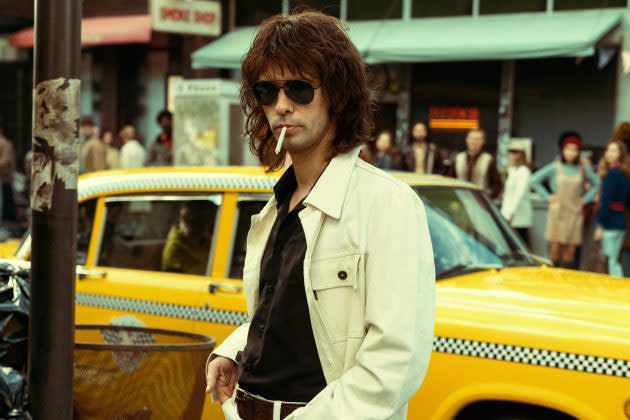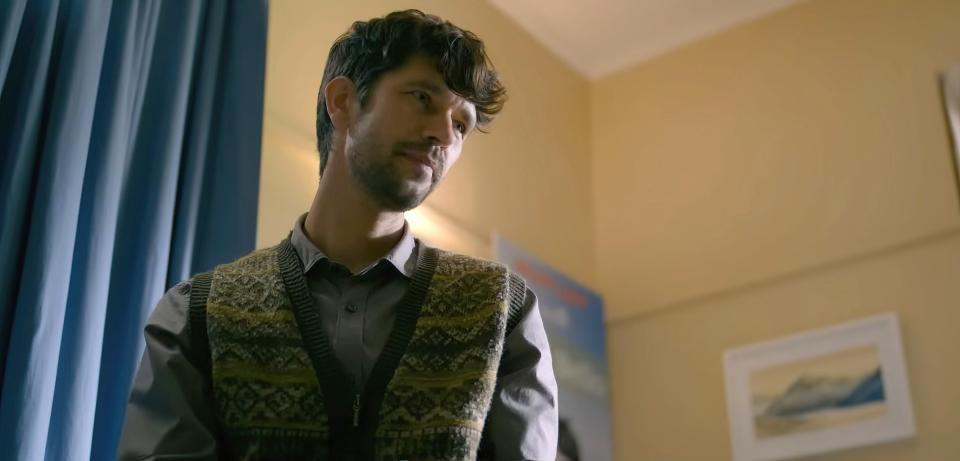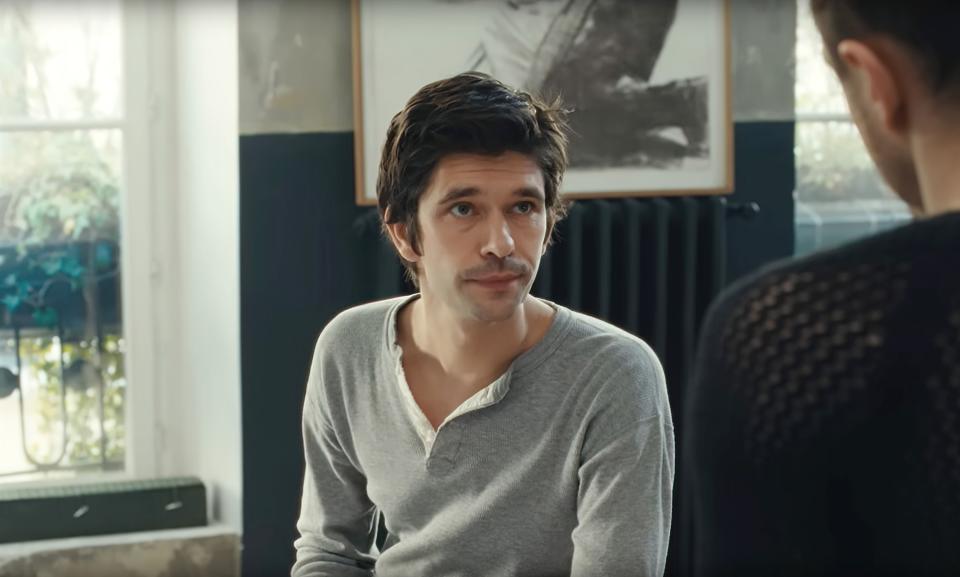‘Limonov’s Ben Whishaw Recalls His First Cannes In 2009: “I Have A Horrifying Memory”

Russian director Kirill Serebrennikov to Cannes this year with his fourth film in Competition and his first in English. Titled Limonov: The Ballad, it tells the incredible story of Eduard Limonov — pronounced “Le-morrr-nov” not “Limunuv” — a Russian renegade poet who traversed the world, reinventing himself whenever times got hard (and they usually did). To star, the director chose British actor Ben Whishaw, himself a chameleonic actor who’s just as at home taking tea with the Queen in his Paddington guise as he is playing Hamlet onstage at the Old Vic. Here, he talks about getting to grips with an enigma and recalls his first-ever Cannes for her movie Bright Star in 2009.
DEADLINE: How did you get involved with this project?
More from Deadline
BEN WHISHAW: It was during lockdown, so I think it was maybe sent to me around August or September 2020. Goodness… A long time ago now! It was during that crazy lockdown time when everyone was wanting to be doing something, but no one could. Anyway, it got sent to me, and then I had a couple of Zoom meetings with Kirill. I knew it was going to be a kind of crazy project, about a very complicated man, but there was just something about it that felt kind of irresistible to me. And kind of terrifying, honestly, at the same time.
DEADLINE: What most appealed to you about this character?
WHISHAW: Well, he was many things, I guess, which is the point. He was a kind of a shapeshifter. He started out being a poet. He was kind of a thug, a pretty urchin thug, but he became quite well regarded as a poet in Soviet times. And then he left the Soviet Union and went to America, and he lived like a bum, really, for ages. But then he became a novelist. Then he went to France, and was quite respected there, and then he went back to Russia, finally, in the ’90s and became a politician. So, he had all these transformations — going from the Soviet Union to the West, and from the West back to Russia — going from an artist to a politician, from a nobody to a celebrity. He went through these distinct phases of life, and they chronicle, in a way, what was going on in the wider world.
DEADLINE: So, does it…
WHISHAW: [Interrupting] Oh, the big thing I forgot to tell you is that he ended up in prison!

DEADLINE: So, does it just deal with certain sections of his life, or is it quite far-reaching?
WHISHAW: It’s quite far-reaching. I think he’s a teenager when we first meet him, and you see him when he’s 60-something, so it’s really wide-ranging. Kirill has called it “a ballad”. It’s a kind of poetic condensing of a lot of time. For instance, there’s a big sequence in the middle of the film where he ends up in New York with his girlfriend. There’s a whole sequence that’s paying homage to the New York of the ’70s and films about New York in the ’70s.
DEADLINE: Where is Serebrennikov based?
WHISHAW: Kirill is, I believe, in Berlin. He’s working all over Europe.
DEADLINE: Had you seen his previous films?
WHISHAW: I’ve seen Summer, and it’s wonderful. He’s also an amazing theater director. He really has this incredible way of staging things. There are lots of sequences done in one take, or these big set pieces that break up the action. I absolutely adored him. He’s really an amazing guy, and an amazing director. So creative.
DEADLINE: Something unusual about this film is that it’s based on a novel — Limonov (2011), by Emmanuel Carrère — that was inspired by Limonov’s life. Is there a similar element of fiction in the film?
WHISHAW: Definitely. I mean, Limonov himself wrote a kind of auto-fiction about his life. No one knows whether it’s really what he lived and did, or whether it’s a fictionalized version of events. So, there’s definitely this kind of slippage in the film, where you don’t know whether what he’s describing is really what happened, or whether it’s a kind of novelistic, free-wheeling reinvention of his own life. So, he could just be a kind of fantasist, in a way. That’s definitely part of what the film’s about, I think. We finished shooting in September 2022, so it’s been a while.
DEADLINE: How much research did you do into the real-life character?
WHISHAW: I did as much as I could. I read his books. In English translations, obviously, since I don’t speak Russian. Actually, they’re all really very interesting. The first one is quite famous, if you know about Limonov, which, in the West, not many people do. The first book he wrote is called It’s Me, Eddie. And anyway, I read three, four, or maybe five of his books, which were the ones I could find in English translations. Obviously, I read the Carrère novel, and read lots about him. There’s now quite a lot of commentary about him. He’s an extremely divisive figure, so there’s lots of quite conflicting views on him, currently. I read all of that, which was fascinating. What else did I do? I watched him a bit. There’s really only one or two interviews of him speaking English, but there are some fascinating interviews with him speaking in Russian or French. I didn’t understand what he was saying, but I could feel the guy.
DEADLINE: Were there people around that knew him? It’s not that long ago, is it?
WHISHAW: Kirill met him. Kirill knew him a tiny bit. But there are so many layers of artifice in the film, not least in the fact that it’s in English, but we start the story in Russia. It felt like it had to be a kind of poetic tribute to him. I couldn’t do an impression or attempt a mimicry of him. I felt there was a point at which I didn’t need to go any further into understanding him more. And so, I let myself be led by Kirill, what he thought about the man and what it was about Limonov that he was intrigued by, which is quite hard to explain. It’s quite mysterious.

DEADLINE: What do you think he was intrigued by?
WHISHAW: Kirill, like all good directors, only tells you as much as you need to know as an actor. He keeps a certain amount to himself, which I respect. I think it is a necessary thing. I’d say there’s an element of not explaining [in directing], because you don’t want the film to be explaining anything. So, he didn’t explain himself to me. But I do remember him saying, very early on, that he saw something of himself in the character, in the person. Of course, they’re not remotely anything like each other. Nothing like each other at all. But yet something resonates with him. I think it’s about what I said at the beginning, I think it’s to do with Limonov reinventing himself. That’s what I love about the film most: you watch somebody get knocked down, and then kind of be reborn over and over again.
DEADLINE: From Serebrennikov’s previous films, it seems he has a rebellious streak too.
WHISHAW: There’s definitely a spirit of rebellion. Limonov was a punk. He was a punk poet. And his whole life was rebellion, really. Whatever situation he was in, he rebelled against it. He never, ever went with the flow. That was his nature. He could be against literally everything. If he was in Russia, he was against that. If he was in the West, he was against that, too. That was his setting, which is very interesting. I think there’s something maddening but appealing about that kind of personality.
DEADLINE: What kind of characters do you prefer to play? Are the more complex characters the most rewarding for you?
WHISHAW: They’re all rewarding. I love all the people that I’ve played, all the characters I’ve played. I don’t have a preference. I just try and honor what that person is, I suppose. I know it’s the kind of thing of lot of actors say all the time, but it’s true. You don’t judge them. They’re doing their thing, and you don’t judge them.
DEADLINE: Are you going to go to Cannes with the film?
WHISHAW: I’m going to be on stage in London, but hopefully I’ll get there.
DEADLINE: What’s your first memory of the Cannes festival?
WHISHAW: It was with a film called Bright Star [2009] that Jane Campion directed. I was 28 or something, and god, it was just amazing, but also really stressful. I have a horrifying memory of walking out of an interview because… I don’t know why; I was just a bit overwhelmed. There ares so many famous people swanning around, and there are all these kinds of old-school glamor rules. I can’t remember precisely what happened, but Jane wasn’t wearing high heels, and that was a problem: she couldn’t go down the red carpet because she didn’t have high heels on. I think she was in mismatched sandals.
DEADLINE: And have you been back since?
WHISHAW: Yeah. I went with The Lobster in 2015.
DEADLINE: So, you’d gotten over the overwhelmingness of it all then?
WHISHAW: Yeah. I was a bit older [laughs]. I could take it more in my stride.
DEADLINE: What tip would you give to your younger self about how to cope with Cannes?
WHISHAW: I’d say, just laugh at it, enjoy it. It’s a spectacle that you can’t take too seriously. I was taking it all far too seriously, as I probably did everything back then. I think I’m a bit of a lighter person now. Back then, I felt everything more than it needed to be felt, and took everything too personally. So, I think I’d have a break. Take a break and go and do something fun.

DEADLINE: It sounds like you’re keeping busy. What are you doing at the moment?
WHISHAW: I just finished filming a film with Ira Sachs. We did Passages together. It’s about a photographer called Peter Hujar, who’s a really extraordinary photographer. Well, he was, he’s passed now — he died of Aids in the ‘80s. And then I go back to London. I’m doing a play at the Royal Court called Bluets. We open in May, exactly when Cannes happens. But I think I can scoot over on the Sunday, my day off.
DEADLINE: What is it about theater that keeps you going back?
Well, I haven’t done a play since 2019, but I used to feel it was very much a part of my life. I’d do a play every year if I could. But, post-pandemic, I haven’t done one. I don’t know how that came to be, but it just didn’t happen. So, I’m excited. I’m doing another play after that; in fact, I’ve got a bunch of plays to do. But, yeah, it’s important to me. Why? It’s something I can’t explain. I think it’s because it’s live. It’s also hard work. You kind of dread it and love it at the same time. The repetition is difficult, but it’s not really that difficult. And you don’t have that with filming.
DEADLINE: Because there’s only one take that makes it into a movie?
WHISHAW: That’s completely right. Sometimes you watch yourself in a film and you think, “Oh God, I could do that scene so much better now,” because you’d get to do it many, many times on stage. [Laughs.] And also get to do it very badly many times, because sometimes things don’t go the way you want them to go. I guess it’s about learning to be present with whatever happens every night. Not trying to recreate something that happened a few nights ago, but being with the night as it is that night.
Best of Deadline
Hollywood & Media Deaths In 2024: Photo Gallery & Obituaries
2024 Premiere Dates For New & Returning Series On Broadcast, Cable & Streaming
2024-25 Awards Season Calendar - Dates For Oscars, Tonys, Guilds, BAFTAs, Spirits & More
Sign up for Deadline's Newsletter. For the latest news, follow us on Facebook, Twitter, and Instagram.


